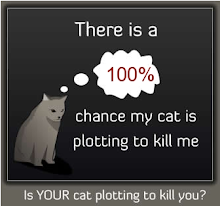You may want to check out the newly added information on Wise Giving further down the page....
Want to know a bit more about what I'm looking at? Perhaps you might want to be looking at these, too...
Ayaan Hirsi Ali Foundation www.theahafoundation.org
You simply cannot fail to be impressed by Ali's fierce dissection of Islam and what it does to women. She is an Amazon in my eyes.
Americans for UNFPA www.americansforunfpa.org
The UN Population Fund funds women's programs worldwide, specifically HIV prevention, family planning and maternal health. If we want to prevent abortions, one of the best ways to do it is to make contraception easier to obtain.
Apne Aap www.apneaap.org
Apne Aap, which means self-help in Hindi, is the labor of love of Ruchira Gupta. Their vision is a world in which no girl or woman can be bought or sold. Their mission is to end sex-trafficking.
Grameen Bank www.grameen-info.org
Muhummad Yunus won the Nobel Prize in 2006 for the microcredit movement that he started in his native Bangladesh in 1976. Loaning money to the poorest of the poor, Yunus found that most loans were repaid and that even small loans could drag women and families out of the direst poverty. While other agencies have taken up the microcredit banner, Grameen remains the highest rated of the microcredit agencies.
Muhummad Yunus won the Nobel Prize in 2006 for the microcredit movement that he started in his native Bangladesh in 1976. Loaning money to the poorest of the poor, Yunus found that most loans were repaid and that even small loans could drag women and families out of the direst poverty. While other agencies have taken up the microcredit banner, Grameen remains the highest rated of the microcredit agencies.
Half the Sky Movement www.halftheskymovement.org
Nick Kristof and Sheryl Wudunn's book and movement surprisingly find their origins in a quote by Chairman Mao! It was one of those few things Mao got right. "Women hold up half the sky." They really do.
The Fistula Foundation www.fistulafoundation.org/congo/
Fistula Foundation helps fund vaginal, rectal and bladder reconstructive surgeries for women who have suffered fistulas at the hand of rapists in Congo. (Fistulas are tears in the vaginal lining that allow urine and/or feces to leak through the vagina, rather than being retained in the bladder or rectum.) The Panzi Hospital in Congo is continually overloaded with women who have been damaged in so many ways it is hard to comprehend. If you need incentive, please read all four pages of the Newsweek article from 2006. Then think about the fact that at least 303 more women were raped (reports still suggest as many as 500+ were) on the UN's watch in late July- early August 2010.
Julie is a freelance photographer based in New Orleans. She has tirelessly documented the BP Deepwater Horizon oil spill and also has an amazing gallery of images of Haiti. Her beautiful images bring added impact to the horrors on the Gulf Coast. She has documented things that I'm sure BP would rather not have out there in her great work for The Atlantic. If I had the ear of the Pulitzer people, I know who I'd be talking up...
Partners in Health pih.org
Partners in Health, the agency founded by Dr. Paul Farmer in 1987, two years after the first clinic in Haiti was opened. PIH is now in Haiti, Rwanda/Burundi, Lesotho, Peru, Siberia, Malawi and Guatemala. Unlike Doctors without Borders, another esteemed organization, PIH is there for the long haul. They have been in Haiti since 1987, caring for the HIV positive and active AIDS population. They were the frontline when the January 2010 earthquake left hundreds of thousands dead, more than a million injured and homeless. The only great mystery to me about this organization is why Paul Farmer, who still teaches medicine at Harvard part of the year, hasn't won the Nobel Prize. For Peace, for Medicine, surely for something if not both. After 33 years on the ground in Haiti, and almost two decades in war-torn Rwanda and Burundi, this man, who raises the funds to build and maintain clinics in some of the poorest and most needy places on the planet is practically a saint in my mind. You can read of his work in Tracy Kidder's inspired book Mountains Beyond Mountains: Dr. Paul Farmer, the Man Who Would Cure the World.
 The Oiled Wildlife Network www.owcn.org
The Oiled Wildlife Network www.owcn.orgMike Ziccardi and his crew provided months of rescue and rehabilitation to wildlife affected by the Deepwater Horizon Oil Spill. Documenting their work in heartbreaking blog entries, they have left an indelible account of the devastating costs of offshore drilling.
Somaly Mam www.somaly.org
Somaly Mam has fought sex slave trafficking in Southeast Asia for more than a decade. She is amazingly courageous as is her family. The goal of the Somaly Mam Foundation is to end sex trafficking, of children, of women, in South East Asia.
The Human Touch www.thehumanetouch.org
Do you wonder if what you eat suffered a horrific life followed by a purportedly merciful death? Check them out. What does organic really mean for animals that have to endure no treatment for health conditions?
Tostan www.tostan.org/
Tostan is a development organization aiding families in West Africa, specifically in countries like Mali, Mauritania, Senegal, Guinea and Guinea-Bissau. They also have programs that have started in Somalia and Djibouti. They used to operate in Sudan, but sadly, have had to close their program in that area. Tostan is a complex, holistic project that involves microcredit, community education, improvements of community hygiene, health care, all with the goal of social transformation and sustainable development. Tostan also uses local staff, so there is less resistance to their work. Tostan is committed to ending the practice of female genital cutting in Africa.
Women for Afghan Women www.womenforafghanwomen.org
The organization that brought Bibi Aisha to the US for her surgery has my every support. There are many other young women like Aisha, who also need the shelter, education and job-training that WAW can provide.
Women for Women International www.womenforwomen.org
Women for Women helps women who are survivors. Survivors of war, of trafficking, of the very worst that the world has to offer. It supports their survival and promotes active advocacy. They work in some of the most treacherous places on the planet for women. Congo, Kosovo, Afghanistan, and the list goes on and on.
For general international relief organizations I strongly recommend readers check out AmeriCares, which has one of the lowest overhead and indirect costs versus funds raised of any organization rated. World Vision is another well known agency with responsible fiscal practices.

A word on wise giving....
I strongly recommend that if you feel motivated to give, you should do your homework and know who you are giving to and what happens to the dollars you give. There are two premier charity/NGO ratings providers- the Better Business Bureau's Give.org and CharityNavigator.org. GiveWell.org, the relatively new kid on the block, sums up the charitable giving situation as follows:
If you find in your investigations of a charity or NGO that more than 15% of your dollar goes to administrative costs or more than 20% goes to further fundraising, you should really ask yourself who is your money really going to?
Let me give you an example. Below you see the pie charts from Give.org for AmeriCares and World Vision, two fiscally responsible organizations, which manage assets and costs superbly or very well.

AmeriCares, on the left, spends less than 1% of its income on administrative costs (the yellow) and less than 1% of its income on further fundraising (beige). Their income is 1.1B US$ a year and about 99% of that goes into programs that help people. AmeriCares does largely internet based fundraising. World Vision, with 957M US$ spends about 9% of its income on fundraising. They are a Christian organization and produce a small magazine and paper products that are distributed in churches. But their administrative costs are low- only about 5%. Thus 86% of your dollar goes to actual programs helping people. These organizations are well known for providing longterm disaster relief in some of the most devastated regions of the world. You can see from several other agencies, albeit with different scopes, (Accion, Heifer) that the program funding with your actual money can be far less, with either high administrative costs, or absurdly high further fundraising costs:

I would say however, that smaller organizations, recent startups may all do good work, and they may have costs you may not have considered. Women's shelters in places like Afghanistan, Sudan/Darfur and Congo may have high security costs. Not just for the women they shelter but for the brave souls who work to protect and rehabilitate survivors there. Security costs for personnel may not be counted as program costs in some instances. They might have to say that protection to staff and administration is administrative overhead. But obviously, those costs are essential to operating in some regions.
In short, know where your really money goes.
This page will be updated from time to time. I really hope that you, my reader, check these links out. You don't have to give. Just be aware. Read their blogs and updates. Be a citizen of a far wider world.






































